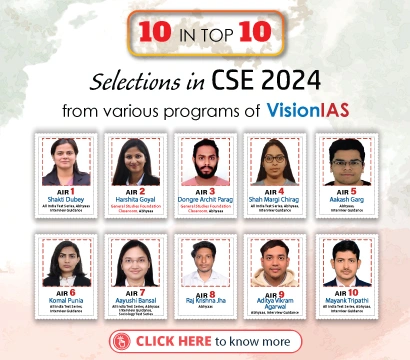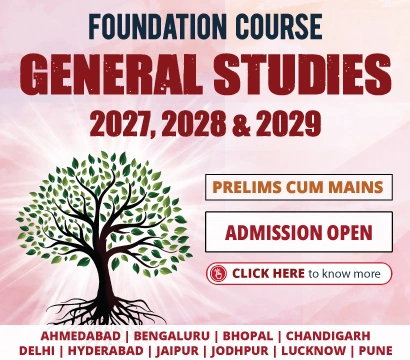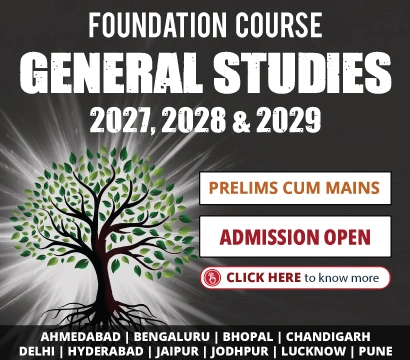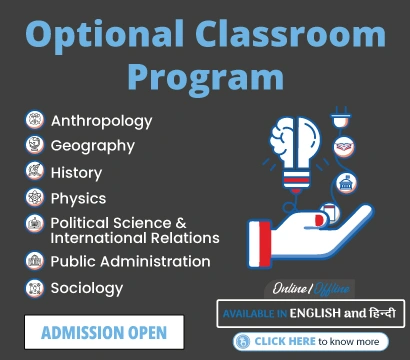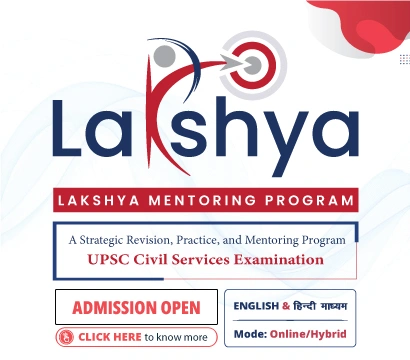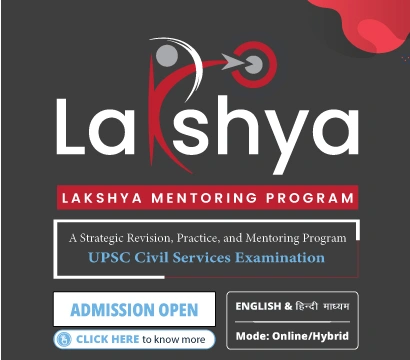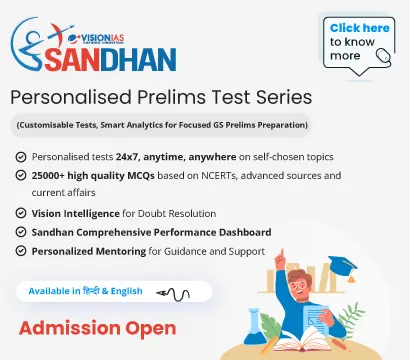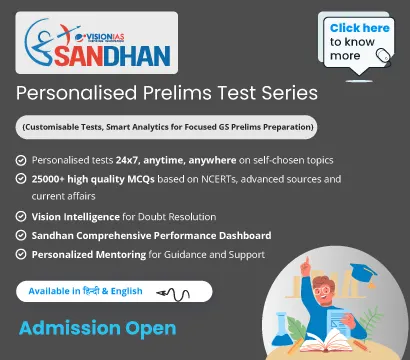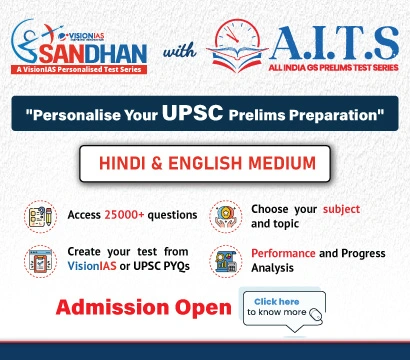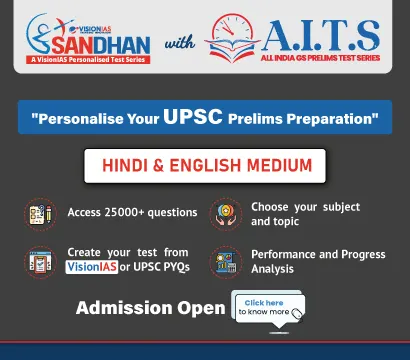Prelims
Detailed Analysis of UPSC Paper 1, GS Prelims 2025 with Answer Key

Your strategic guide to understand subject-wise trends, difficulty levels, and UPSC preparation insights
The UPSC Civil Services Preliminary Examination is the gateway to India’s most prestigious services including the Indian Administrative Service (IAS), Indian Police Service (IPS), and Indian Foreign Service (IFS).
In the prelims stage, General Studies Paper 1 (GS Paper I) plays a pivotal role, assessing an aspirant’s grasp over diverse subjects like History, Geography, Polity, Economy, Environment, Science & Technology, and Current Affairs.
Prelims serves as a screening test—only those who clear the cut-off in GS Paper I and score a minimum of 33% in CSAT (Paper II) qualify for the Mains stage of UPSC CSE.
This blog presents a detailed analysis of UPSC Prelims Question Paper (GS Paper I), examining subject-wise trends, difficulty levels, comparison with UPSC PYQs, and key takeaways to help aspirants—both current and future—align their strategy with the evolving nature of UPSC General Studies.
UPSC CSE 2025 General Studies Paper Overview
- Total Questions: 100
- Total Marks: 200
- Negative Marking: 1/3rd for every incorrect answer
- Time: 2 Hours
UPSC Prelims 2025 General Studies Question Paper -1
Subject-wise Question Distribution (To be updated after the exam)
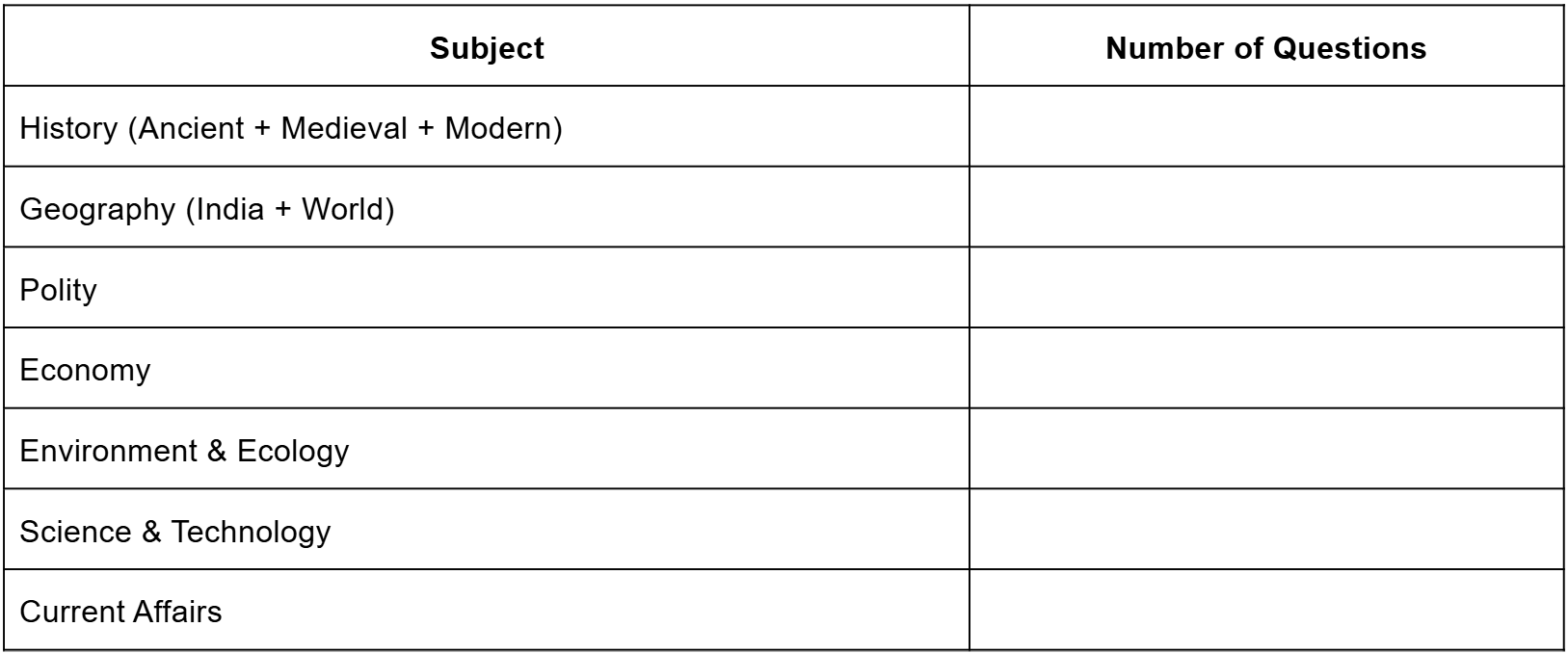
Subject-wise Difficulty Analysis (To be updated post exam)
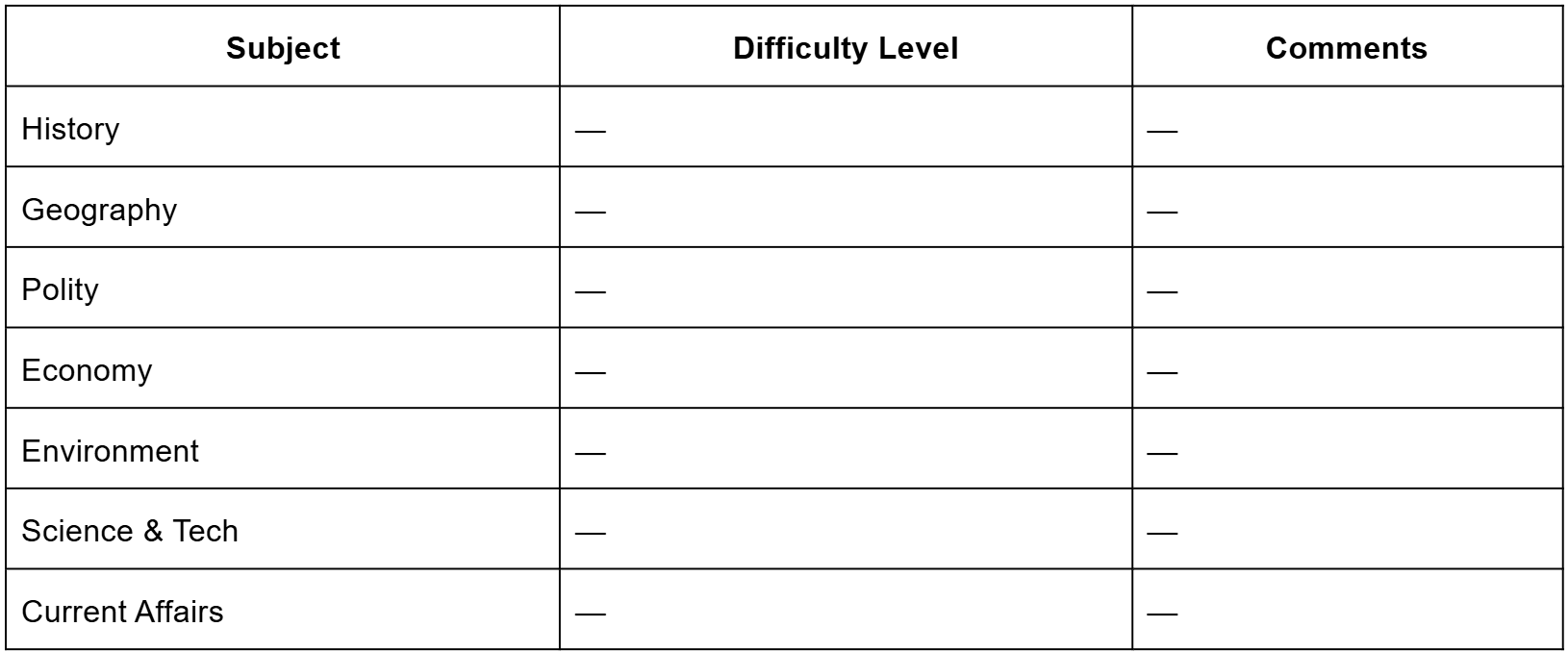
Prelims 2025: Overall Trend and Key Takeaways
(To be updated)
Comparison with Previous Years: A Glimpse of 2024
The UPSC Prelims 2024 GS Paper I emphasized a balanced preparation strategy.
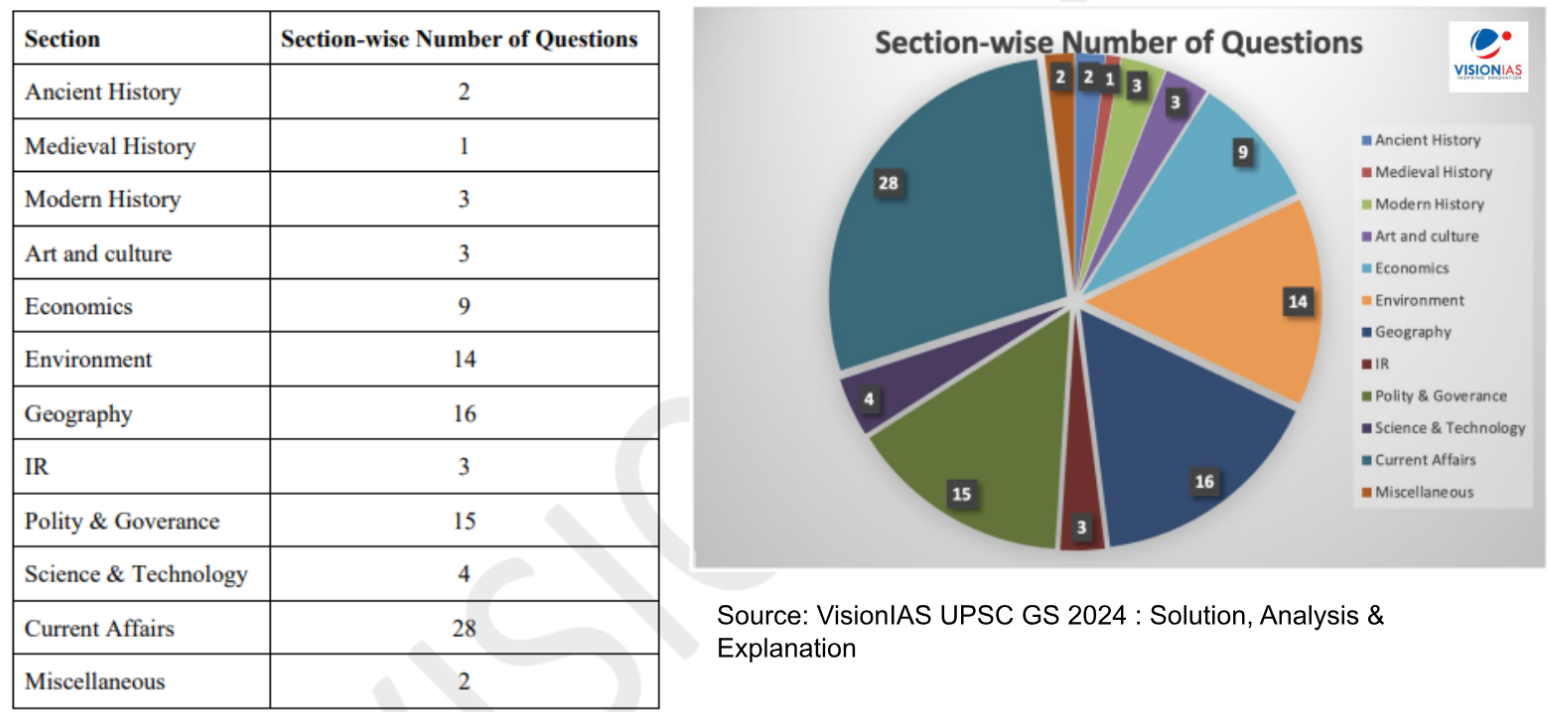
Key observations from UPSC 2024 Prelims Paper:
- UPSC 2024 paper as compared to previous UPSC general studies paper has drawn the attention towards preparing in a holistic and balanced manner.
- Many conventional and static subjects have been given due weightage.
- The focus in the paper was more on testing the aspirants on the basic facts surrounding the core concepts in most of the subjects which has made the paper more doable! Thus overall difficulty was more on a moderate level.
- The good news was that “Elimination skills” made a comeback in the paper.
- Current Affairs and related issues still hold good in terms of being an inspiration behind many static questions.
- In terms of subject weightage, Geography has come with a bang! Almost 20 questions came alone from geography and with environment and ecology clubbing with it, it dominated this year’ s paper.
- Polity & Governance was conventional and was more on the easier side.
- In the History section, the weightage of modern history is declining but the questions asked were doable and conventional. Art & Culture was more driven by current affairs. And when it comes to ancient and medieval, less questions were asked as compared to last year.
- Science & Technology questions were tilted towards using the latest technology and the questions topics were less complicated. Further, defence and security questions were also seen after a long time. And, International relations questions were on the expected lines.
- Economics questions were both conceptual and news oriented.
To know more about General studies for UPSC with the subject wise analysis, current affairs subject wise distribution, difficulty level, nature of question and its source type, download UPSC GS 2024 : Solution, Analysis & Explanation
VisionIAS Subject-wise 10 year UPSC PYQ Analysis
Lessons & Strategy for Future Preparation
Insights from recent UPSC PYQs reveals clearly that:
- Strong foundational understanding is non-negotiable for clearing UPSC Prelims.
- Conceptual clarity is key—rote learning alone won’t help.
- Balanced preparation is essential: No static subject can be ignored—give equal attention to Polity, History, Geography, Economy, Environment, and Science & Technology.
- Mere selective preparation is ineffective—broad syllabus coverage is the only viable strategy.
Practice is the Prelims Success Mantra
Regular practice through high-quality mock tests enhances speed, accuracy and elimination skills. Mock tests simulate real exam temperament, and consistent revision sharpens retention and decision-making under pressure—essential for handling the unpredictable nature of UPSC Prelims Question Papers. Quick revision materials, crisp notes, and smart revision tools are game-changers for last-mile effectiveness.
“The more mistakes you make in mocks, the more you learn—and the less likely you are to repeat them in the real exam,” VisionIAS Classroom Student, Harshita Goyal (AIR-2, UPSC 2024) says at VisionIAS Topper Talk Event.
Watch: Talk of VisionIAS Topper Harshita Goyal (AIR 2)

Key Learning for Future Aspirants
1. Integrate Current Affairs with Static Subjects
UPSC increasingly asks questions where current events are embedded within static frameworks.
- Link newspaper reading with standard books and class notes
- For subjects like Polity, Economy, Geography, and Environment, connect conceptual theories with current events
This improves memory and enhances your ability to apply concepts to questions.
2. Don’t Ignore Environment and CSAT
- Environment continues to have 15–20 questions, many based on factual details and conservation initiatives. With regular revision, it becomes a scoring subject.
- CSAT, although qualifying, is not to be underestimated—its rising complexity led to many failures in 2023 & 2024.Regularly practice comprehension, basic maths, and reasoning to avoid surprises.
3. Focus on Conceptual Clarity & Interdisciplinary Linkages
UPSC questions test understanding, not mugging. Grasp the broader context of concepts like inflation, federalism, monsoon, biodiversity etc. Clarity from NCERTs, PYQs and standard sources helps tackle complex or indirect questions with confidence.
4. Prepare for Elimination-Based MCQ Strategy
Options are now more complex, often including traps like: “Only one is correct”, factually tricky phrasing among others. To master the elimination skill, identify keywords, spot contradictions, use general awareness, narrow down when unsure. Mastery improves by solving UPSC PYQs and mock tests—a skill often decisive for cracking UPSC CSE.
Know the Topper Archit Dongre’s (AIR-3, UPSC 2024, AIR-153 UPSC 2023) way of surviving UPSC’s toughest MCQ format, Watch: Talk of VisionIAS Topper Archit Dongre (AIR 3).

Further, join Sandhan Personalised Tests for a Strategic Re-Evaluation of Your Preparation. And also use:
- PT365 for Current Affairs
- Mains365 for continuity in GS preparation
Conclusion
A clear trend is emerging in UPSC General Studies—a shift towards analytical thinking and balanced paper setting. Aspirants who rely not just on one subject or limited topics but maintain consistency across static and current affairs are rewarded.
This confirms that UPSC’s evaluation is moving from memory-based to reasoning-driven. The ability to interlink concepts, apply logic, and remain calm under pressure is now a must-have skill.
As seen in recent years, aligning yourself with this evolving PYQ trend is the only pathway to success in UPSC Prelims.
Frequently Asked Questions (FAQs) (To be updated)
Q. How many questions came from Current Affairs in GS Paper 1?
A. (To be updated post-exam)
Q. Was the 2025 Paper 1 tougher than 2024?
A. (VisionIAS Expert analysis to follow after paper release)
Q. Which subject had the highest weightage?
A. (Subject-wise breakup to be shared post-analysis)
Q. Will the difficulty level impact the Cut-Off?
A. Yes. If the paper is more difficult than usual, the cut-off is likely to drop.
Q. How can I best align my preparation with UPSC trends?
A. Focus on syllabus coverage, integrate current affairs with static subjects, and practice high-quality VisionIAS mock tests regularly.






























